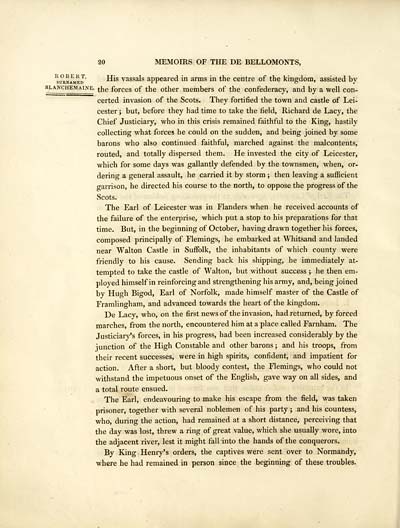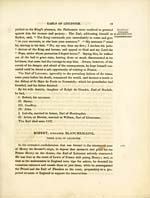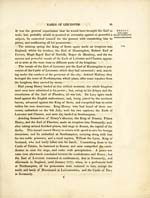Download files
Complete book:
Individual page:
Thumbnail gallery: Grid view | List view

20 MEMOIRS OF THE DE BELLOMONTS,
"suemeb ' ^* s vassa ^ s appeared in arms in the centre of the kingdom, assisted by
blanchemaine. t h e f orces f the other members of the confederacy, and by a well con-
certed invasion of the Scots. They fortified the town and castle of Lei-
cester ; but, before they had time to take the field, Richard de Lacy, the
Chief Justiciary, who in this crisis remained faithful to the King, hastily
collecting what forces he could on the sudden, and being joined by some
barons who also continued faithful, marched against the malcontents,
routed, and totally dispersed them. He invested the city of Leicester,
which for some days was gallantly defended by the townsmen, when, or-
dering a general assault, he carried it by storm ; then leaving a sufficient
garrison, he directed his course to the north, to oppose the progress of the
Scots.
The Earl of Leicester was in Flanders when he received accounts of
the failure of the enterprise, which put a stop to his preparations for that
time. But, in the beginning of October, having drawn together his forces,
composed principally of Flemings, he embarked at Whitsand and landed
near Walton Castle in Suffolk, the inhabitants of which county were
friendly to his cause. Sending back his shipping, he immediately at-
tempted to take the castle of Walton, but without success ; he then em-
ployed himself in reinforcing and strengthening his army, and, being joined
by Hugh Bigod, Earl of Norfolk, made himself master of the Castle of
Framlingham, and advanced towards the heart of the kingdom.
De Lacy, who, on the first news of the invasion, had returned, by forced
marches, from the north, encountered him at a place called Farnham. The
Justiciary's forces, in his progress, had been increased considerably by the
junction of the High Constable and other barons ; and his troops, from
their recent successes, were in high spirits, confident, and impatient for
action. After a short, but bloody contest, the Flemings, who could not
withstand the impetuous onset of the English, gave way on all sides, and
a total route ensued.
The Earl, endeavouring to make his escape from the field, was taken
prisoner, together with several noblemen of his party ; and his countess,
who, during the action, had remained at a short distance, perceiving that
the day was lost, threw a ring of great value, which she usually wore, into
the adjacent river, lest it might fall into the hands of the conquerors.
By King Henry's orders, the captives were sent over to Normandy,
where he had remained in person since the beginning of these troubles.
"suemeb ' ^* s vassa ^ s appeared in arms in the centre of the kingdom, assisted by
blanchemaine. t h e f orces f the other members of the confederacy, and by a well con-
certed invasion of the Scots. They fortified the town and castle of Lei-
cester ; but, before they had time to take the field, Richard de Lacy, the
Chief Justiciary, who in this crisis remained faithful to the King, hastily
collecting what forces he could on the sudden, and being joined by some
barons who also continued faithful, marched against the malcontents,
routed, and totally dispersed them. He invested the city of Leicester,
which for some days was gallantly defended by the townsmen, when, or-
dering a general assault, he carried it by storm ; then leaving a sufficient
garrison, he directed his course to the north, to oppose the progress of the
Scots.
The Earl of Leicester was in Flanders when he received accounts of
the failure of the enterprise, which put a stop to his preparations for that
time. But, in the beginning of October, having drawn together his forces,
composed principally of Flemings, he embarked at Whitsand and landed
near Walton Castle in Suffolk, the inhabitants of which county were
friendly to his cause. Sending back his shipping, he immediately at-
tempted to take the castle of Walton, but without success ; he then em-
ployed himself in reinforcing and strengthening his army, and, being joined
by Hugh Bigod, Earl of Norfolk, made himself master of the Castle of
Framlingham, and advanced towards the heart of the kingdom.
De Lacy, who, on the first news of the invasion, had returned, by forced
marches, from the north, encountered him at a place called Farnham. The
Justiciary's forces, in his progress, had been increased considerably by the
junction of the High Constable and other barons ; and his troops, from
their recent successes, were in high spirits, confident, and impatient for
action. After a short, but bloody contest, the Flemings, who could not
withstand the impetuous onset of the English, gave way on all sides, and
a total route ensued.
The Earl, endeavouring to make his escape from the field, was taken
prisoner, together with several noblemen of his party ; and his countess,
who, during the action, had remained at a short distance, perceiving that
the day was lost, threw a ring of great value, which she usually wore, into
the adjacent river, lest it might fall into the hands of the conquerors.
By King Henry's orders, the captives were sent over to Normandy,
where he had remained in person since the beginning of these troubles.
Set display mode to:
![]() Universal Viewer |
Universal Viewer | ![]() Mirador |
Large image | Transcription
Mirador |
Large image | Transcription
Images and transcriptions on this page, including medium image downloads, may be used under the Creative Commons Attribution 4.0 International Licence unless otherwise stated. ![]()
| Histories of Scottish families > Historical and genealogical memoirs of the House of Hamilton > (30) Page 20 |
|---|
| Permanent URL | https://digital.nls.uk/95390147 |
|---|
| Description | A selection of almost 400 printed items relating to the history of Scottish families, mostly dating from the 19th and early 20th centuries. Includes memoirs, genealogies and clan histories, with a few produced by emigrant families. The earliest family history goes back to AD 916. |
|---|

